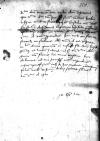Letter #1366
Mauritius FERBER to Ioannes DANTISCUS[Elbing (Elbląg)], [1535-10-23]
| received Elbing (Elbląg), [1535]-10-23 Manuscript sources:
Auxiliary sources:
Prints:
| ||||||||
Text & apparatus & commentaryPlain textText & commentaryText & apparatus
Reverendissimo domino meo,
Reverendissime domine.
Movent me verba domini capitanei, quae Reverendissimae Dominationi Vestrae per suum nuntium hodie vesperi nuntiare fecit, quod cum

